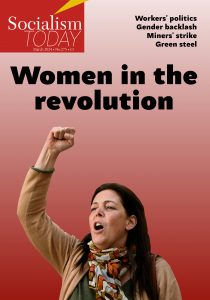January brought the sad news of the passing of Alan Hardman, a long-standing member of the Socialist Party and its predecessor, Militant; becoming, indeed, the organisation’s first printer.
Alan will be known to many as an acclaimed cartoonist, for the Militant newspaper and its successor, the Socialist, and the countless posters and agitational leaflets that his work appeared on (and still does to this day). An obituary was published in issue 1260 of the Socialist, including a tribute by Linda Taaffe and Peter Taaffe, the founding editor of the Militant.
But Alan was also a keen enthusiast for Socialism Today and, before that, the Militant International Review, on both of which I had the privilege of working with him as he sought to use his unique artistic vision and technical talents to promote the broader ideas of Marxism.
He was conscientious and exacting in all respects, wanting to make sure that he was accurately presenting our position in the magazine cover designs he prepared. I often felt I was spending more time discussing an article with its cartoonist than its author! But most often his images had at least equal impact, sometimes greater, in conveying the essence of an issue in its immediate aspect.
A quality hardcover book collection of Alan’s cartoons, under the title, Need Not Greed, is currently in preparation by the specialist social documentary publishers Bluecoat Press. To finance its production a Kickstarter has been launched, through which pre-orders of the book can be made (at https://www.kickstarter.com/discover/advanced?ref=nav_search&term=Alan%20hardman). But in the meantime, published here, is a selection of just some of the many covers he did for us in his life-long fight for a new, socialist world.
Clive Heemskerk, Socialism Today Editor
Read more →

